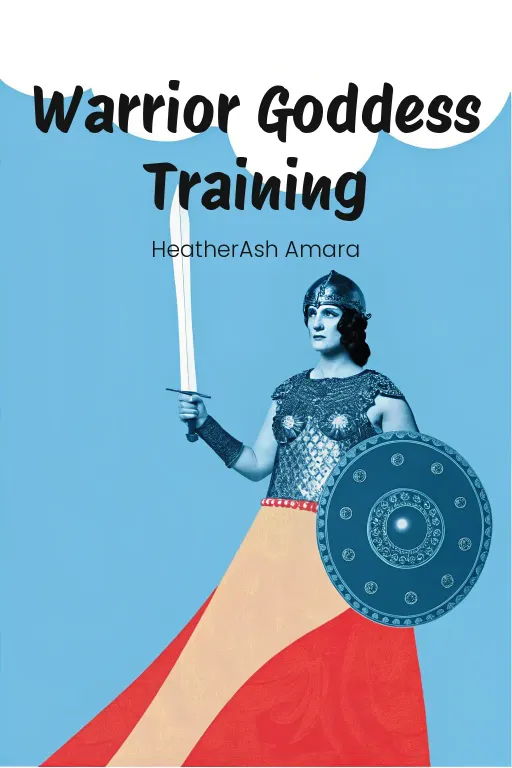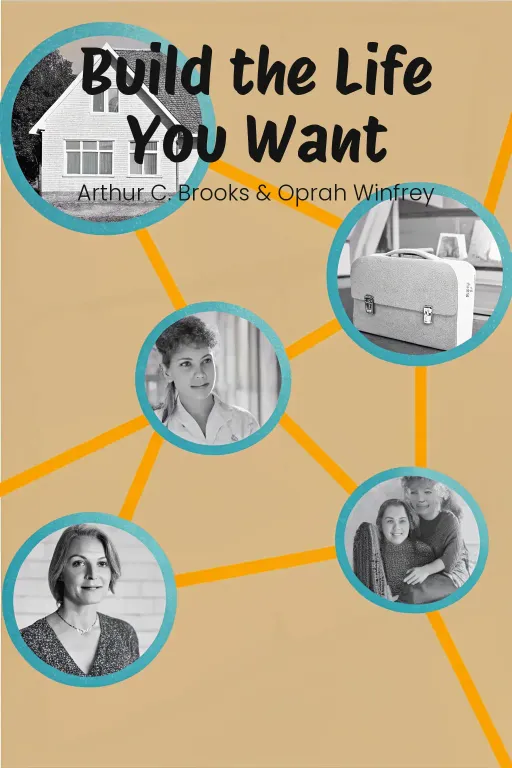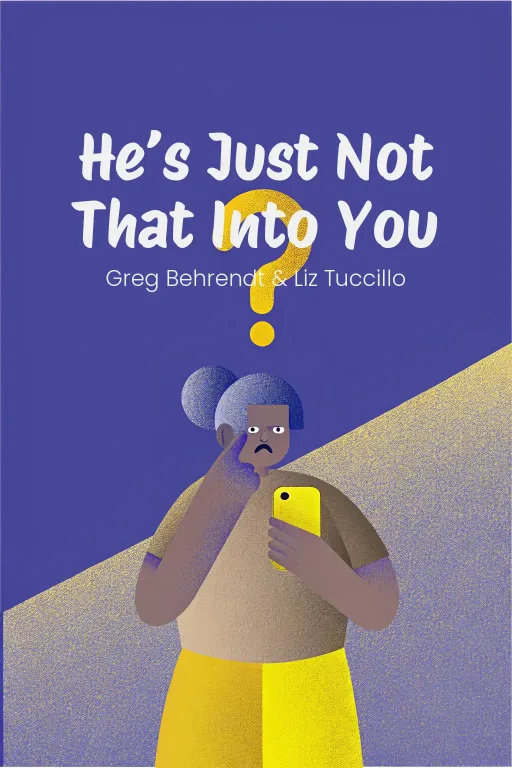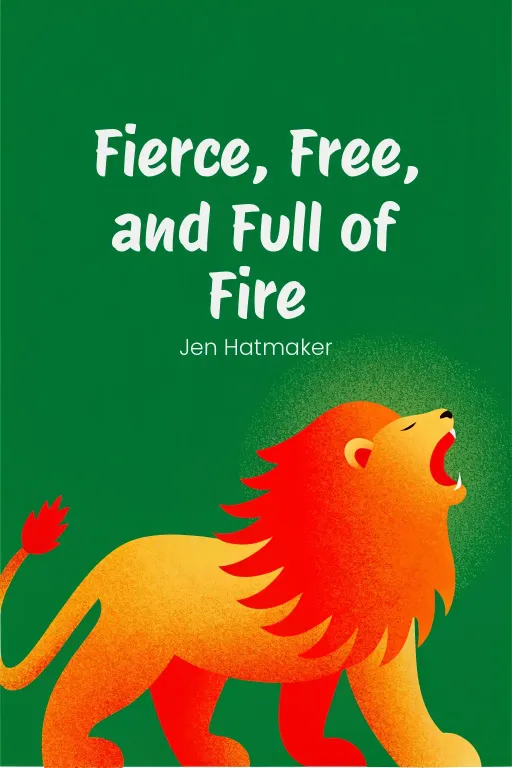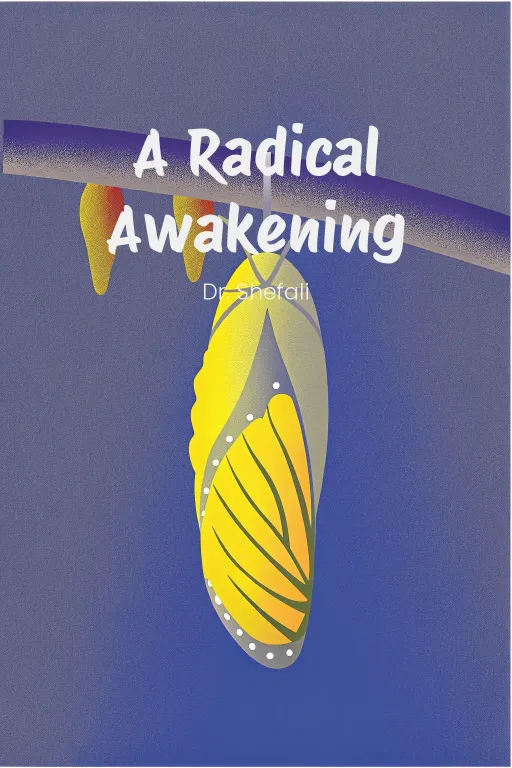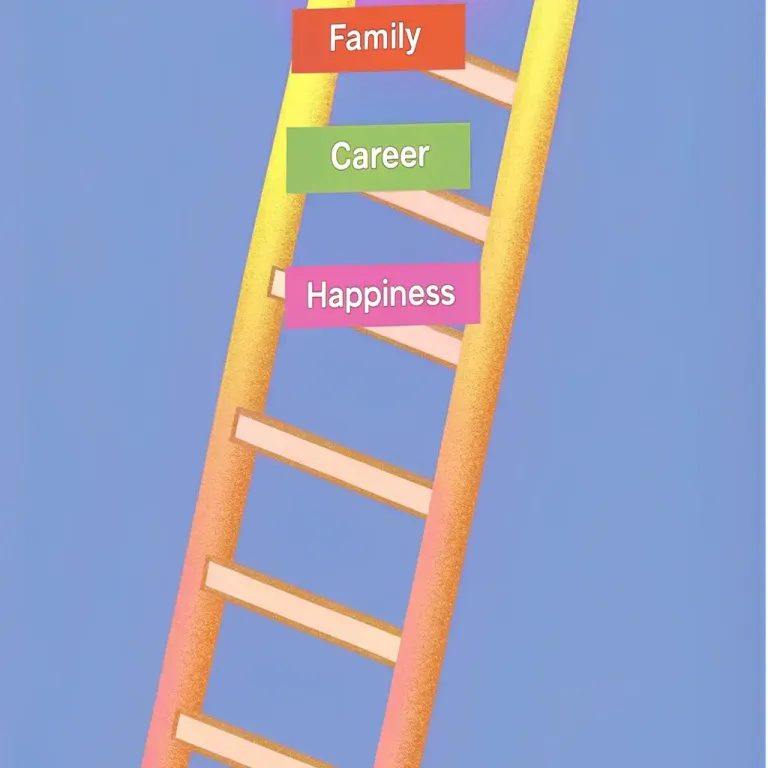
Build Your "Happiness House"
Podcast by Beta You with Alex and Michelle
The Art and Science of Getting Happier
Build Your "Happiness House"
Part 1
Alex: Hey everyone, and welcome! Today we’re tackling something we all crave but often struggle to grasp: happiness. I mean, we all want it, right? So why does it sometimes feel so… out of reach? Michelle: Exactly, Alex. You know, it's like chasing a mirage. We tell ourselves, "If I just nail that promotion," or "If I finally find 'the one', then I'll be happy!" Newsflash: life doesn't quite work that way. Alex: Absolutely! And that's “really” the core of Build the Life You Want: The Art and Science of Getting Happier by Arthur C. Brooks and Oprah Winfrey. It's not about instant gratification or some magical happiness pill. It’s about understanding that happiness isn't a fixed point, it's more of a road, a living process that's actively shaped by our daily decisions. Michelle: So, Brooks and Oprah sort of present happiness as constructing a house. I mean, you've got the foundation, then the walls go up, and finally, you’ve gotta have a roof. If you skip any step, the whole thing's unstable. Today, we're going to break it down into those parts: managing emotions, building relationships, and finding purpose, be that through our work or through something spiritual. Alex: Right, like emotional management is the bedrock. It’s learning to navigate your inner world so that when life throws you curveballs, you don't completely fall apart. Michelle: Then we have the walls – relationships. I mean, what's the point of a house if it’s empty, right? If there's no one to share it with? Alex: Exactly, and topping it all off is the roof – purpose and transcendence. That's where meaningful work, spiritual growth come in—these elements truly shelter and complete us. Michelle: So, whether you're trying to toughen up your emotional resilience, deepen your connections, or find deeper meaning, this episode is for you. Let’s dive in!
Emotional Management
Part 2
Alex: So, to pick up where we left off, let's “really” dig into the foundation of all this: emotional management. You know, it's fascinating because, like Brooks and Oprah point out, this is the core work we've got to do on ourselves before we can actually thrive in relationships or, you know, find any lasting sense of purpose. Michelle: Yeah, makes total sense. If your emotions are just a total mess, it's like trying to build a house on quicksand, right? But, here's what I'm wondering, what exactly do they even mean by "managing emotions"? Like, isn't that just stifling your feelings? Alex: Not at all. Emotional management isn't about, you know, suppressing feelings. It's about understanding them, reflecting on them, and then, you know, intentionally creating constructive responses. One key technique they talk about is metacognition—basically, thinking about your thinking. It's like stepping back to observe your emotions instead of just, you know, being totally at their mercy. Michelle: Right, so instead of, like, raging at some guy who cuts you off in traffic, you're supposed to pause and say, "Hmm, interesting, I seem to be experiencing anger. Let's investigate that." Alex: Exactly! It might sound kind of funny, but even pausing for just that bit of self-reflection can diffuse that impulse to react. I mean, the book even talks about journaling as a way to put this into practice. Taking the time to write your thoughts down... it makes them tangible. You stop spiraling, and you start, you know, spotting patterns or triggers. Like that young professional, for example, with all that career frustration. They realized, that their stress boiled down to a fear of failure, not just, you know, the work stuff. Michelle: Okay, but let's be real, how do you go from, "I'm stressed" to, like, identifying a deep-seated fear of failure? That's a huge leap! Alex: Yeah, but that's the power of curiosity about your own thoughts, right? Rather than just saying, "I'm stressed," you dig deeper. What feels unsettled? What's the worst-case scenario I'm afraid of? That kind of self-exploration helps you understand what's fueling your emotions. And, you know, the more you practice, the easier it gets to connect those dots. Michelle: Alright, I'll admit that sounds… useful, if not exactly a ton of fun. But here's another question: How do you avoid becoming, I don’t know, a robot who overanalyzes every single feeling like it’s some kind of weird science experiment? Alex: Great point! And that's where the second metacognitive technique kicks in—observing emotions without judgment. You're not trying to dissect everything into oblivion, you're creating space for those emotions to exist without letting them control you. So, picture this, you feel angry after a disagreement. Instead of spiraling into, "I'm furious; they're awful!" You just sit with it. Think, "Okay, this is anger. I don't need to act on it immediately." Michelle: So, less snapping at your coworker, more breathing into a paper bag until the fury subsides? Alex: Well, I'd probably skip the paper bag in public, but yes! Observing without judgment creates a calmer internal dialogue. That makes it easier to respond rationally and, you know, constructively. Michelle: Alright, I like the logic here. But tell me this, beyond just managing the emotions that already exist, can you actually, like, replace the negative ones with positive ones? Because that sounds way more appealing to me at least. Alex: Yeah, we can, and it's kind of a cornerstone of emotional management, actually. The book highlights things like gratitude, humor, and hope as powerful strategies for cultivating positivity. Gratitude, for example, “really” rewires your brain over time. By regularly focusing on what's good in your life—no matter how small—you shift away from that endless loop of scarcity or dissatisfaction. Michelle: They mentioned a woman who used gratitude to cope with financial hardship, right? She started by acknowledging like, the tiniest blessings, like the warmth of a blanket or a kind word. Honestly, I respect that. It's so easy to overlook the basics when you're stressed. Alex: I know! That's the beauty of it. By starting with those small things, she gradually reframed her perspective, building resilience even when her external circumstances didn’t immediately change. I mean, it's not about being delusional; it's about actively seeking balance in your emotional focus. Michelle: And I'm guessing that's where, like, humor comes in, too? Finding a way to laugh at life's absurdities instead of, you know, crying over them? Alex: Exactly! Laughter not only reduces stress, but it also helps you bounce back from failures. Like that example of coworkers laughing after a project tanked. Channeling humor helped them bond and turn failure into, you know, a steppingstone for growth. Michelle: So, it’s less, “We’re doomed,” and more, “Wow, we “really” messed that up– but hey, at least we’ve got a great cautionary tale now." Alex: That’s the spirit! And then there’s hope, which is probably the most transformative of these practices. It's not about ignoring reality. It’s about believing that, even when facing challenges, there’s definitely a way forward. For example, there was a patient battling chronic illness who shifted her focus to advocacy for others, finding meaning through her experience. Michelle: Right, and that hope wasn’t blind optimism, I noticed. It was actually grounded in action. Instead of feeling powerless, she chose to make her experience purposeful. That’s a mindset anyone could apply, even in smaller-scale situations, right? Alex: Exactly. Gratitude, humor, and hope aren’t magic wands, but they’re tools we can use to challenge that negativity. They help disrupt those downward thought spirals and replace them with something more constructive. Michelle: Okay, and now that we’ve addressed cultivating positivity, let’s talk about the flip side—those emotions everyone loves to hate–Envy and shame. With social media amplifying them, they seem harder to escape, right? Alex: Oh, that’s a “really” important piece of the emotional management puzzle. Social media thrives on comparison. The book even talks about how it creates a kind of toxic envy loop, where we’re constantly measuring ourselves against this curated perfection. Michelle: Yeah, I've read studies about how those “perfect” lives we see online actually trigger the same areas in our brain as physical pain. Wild, right? But also, how do you break out of that envy trap if it feels so automatic? Alex: One approach is to shift your focus outward, you know? Remind yourself that those curated lives are not the whole story. For example, that influencer seems to have it all but is grappling with the pressure to maintain that image. That reality-check alone can help neutralize envy’s power. Michelle: And then there’s radical authenticity—just owning your own imperfections outright, right? Alex: Spot on. When you’re authentic, you stop hiding behind perfection, and you, you know, open the door to deeper, more meaningful connections. Imagine, for example, someone at work opening up about anxiety. It risks vulnerability, but other people often meet them with empathy instead of judgment. Michelle: And just like that, shame loses its grip. What I’m hearing is that emotional management isn’t just a personal win; it impacts how we interact with the world, too, right? Alex: Exactly! When we regulate our emotions, we show up better in every area of life—from relationships to purpose-driven work. It’s the foundation for meaningful and resilient living.
Relationships and their Impact on Happiness
Part 3
Alex: So, Michelle, as we were saying, understanding our emotions is key, but it's also about how we connect with others. If we can't handle our feelings, building solid relationships becomes “really” tough, wouldn't you agree? Michelle: Absolutely! It's like, if your emotional house is a mess, how can you invite people in? Alex: Exactly! And relationships truly are the walls of our “happiness house.” They give us structure and meaning. Whether it's family, friends, or even work connections, they all “really” matter. Michelle: So, let's dive in. Where should we start? Alex: Well, let’s start with family. They're usually the longest-lasting relationships, right? But, let’s be real, they can also be the most… complicated. Michelle: Tell me about it! Families, they can be your greatest joy and your biggest headache, sometimes simultaneously. So, what does the book suggest for making these dynamics a bit smoother? Alex: The book “really” emphasizes effective communication. It's not just about talking, but really listening, clearly saying what you need, and finding that sweet spot in the middle. Think about a teenager arguing with their parents about curfew. The teen thinks the rules are pointless, while the parents are just trying to keep them safe. Michelle: Ah, the classic "you don't trust me!" versus "I'm doing this for your own good!" showdown. I remember those days... vividly. Alex: Totally! But this is where a real conversation can change everything. When both sides actually listen—parents explaining their worries, the teen talking about wanting more freedom—they can usually find a compromise. Not only does it solve the immediate problem, but it builds trust for the future. Michelle: So, the key is to listen to understand, not just to win the argument. Smart. But let's be real, families can hold onto grudges like it's an Olympic sport. We can’t expect every conflict to resolve so neatly, especially with years of history behind it. . How does the book handle that? Alex: That's where forgiveness comes in. It’s not about saying what they did was okay or pretending it never happened. It's about choosing to let go of the anger. Michelle: Easier said than done, right? Give me an example... Alex: There’s a powerful story about two siblings who had a huge fight over an inheritance and didn't speak for years. But then, when their parent got sick, they had to work together again. It forced them to talk. Michelle: Forgiveness probably didn't happen overnight, I'm guessing. Years of resentment can't just vanish. Alex: Nope, it was a long road. But because they acknowledged their past issues and deciding their sibling bond was worth more than holding onto anger, they slowly mended things. And get this, studies show that families who forgive each other actually have less stress and bounce back better from tough times. Isn't that amazing? Michelle: It is. Carrying around that kind of anger is exhausting. But forgiveness gets even harder when family members have totally different expectations, doesn't it? Alex: Absolutely. And that leads us to embracing individuality within families. Those differences—values, career paths, whatever—can be a real source of tension. The book talks about a family where one person chose to be an artist. The rest of the family wasn't thrilled because they wanted them to have a stable, "respectable" job. Michelle: Let me guess, the artist didn't suddenly become the black sheep who redeemed themself overnight? Alex: Not at all! But over time, through talking and trying to understand, the family realized that their loved one's happiness was more important than a steady paycheck. They had to redefine what "success" meant for them. That kind of support and acceptance strengthens bonds, even when people go in different directions. Michelle: Okay, family's tough but essential. Makes sense. Now, let's talk about friends—the family you choose. I feel like modern life makes it almost impossible to keep up with friendships. Alex: I hear you. It's a common struggle, but good friendships are so important for our happiness. They “really” protect us from feeling alone. Michelle: So, how do we build and keep those connections strong? Alex: The book highlights authentic connections where vulnerability and trust replace surface-level interactions. Like friends who hike together every week. It's not only about exercise; it's sharing experiences, facing challenges as a team, and forming reciprocal commitment. Michelle: So, friendships are kind of like emotional mirrors? You reflect and support each other. But what about making new friends? It's like everyone forgets that's a thing adults need. Alex: It can be daunting, especially as we get older. One tip is to embrace diversity—befriend people who see the world differently. Think about two coworkers, one from a farm, the other from a city. At first, they might clash, but working together can lead to a real appreciation for each other's strengths. Those differences can make the friendship better. Michelle: Sounds good in theory, but, our culture is all about screens. How is that helping friendship grow? Alex: You've hit on something. The book says that digital interactions often miss the depth of real-life connections. Take a young professional with tons of online "friends" who still felt “really” lonely. When she cut back on screen time and started meeting people for coffee, her sense of belonging and happiness went up. Michelle: So, less scrolling, more talking. Got it. In essence, both family and friendships need constant attention and effort. You don't just have them; you have to build them and keep them strong. Alex: Exactly! Relationships thrive on communication, forgiveness, acceptance, and investment. They're not one-off tasks, but ongoing things that make us feel supported and connected. We're social creatures, after all. Real happiness comes from nurturing those connections with care. Michelle: So, in the end, relationships are less about the easy comfort we expect and more about growth, resilience, and consistently showing up, whether you're dealing with family drama or grabbing coffee with a friend. They require us to be active participants in each other's lives, navigating complexities and supporting each other through thick and thin. Alex: Precisely. And when those connections are strong, they become the support system that get us through life's ups and downs.
Work, Purpose, and Spiritual Fulfillment
Part 4
Alex: So, Michelle, after laying such strong emotional and relational foundations, we naturally start thinking about work and purpose. It’s like, once you feel solid inside and with your relationships, you ask yourself, "Okay, what's my life “about”?" Michelle: Right? It’s interesting. "What am I “doing” with my life?" It makes sense. Alex: Exactly! Work, purpose, even spiritual fulfillment, they form the roof of this metaphorical house of happiness. They give us that sense of... shelter, almost? The feeling that what we do every day lines up with who we are and what we value. Michelle: So this section takes us beyond our immediate personal bubbles—to the broader actions that make life meaningful. Alex: Exactly. Michelle: Okay, but let's tackle the big question first. Is work “really” a source of happiness? I mean, come on, how many people actually leap out of bed, excited to face their overflowing inbox? Alex: Fair point! But it totally depends on the “kind” of work, you know? The book really stresses that meaningful work—work that resonates with your passions and values—can actually enrich your life. It isn't about fancy titles or huge paychecks; it's about feeling connected and making a contribution. Michelle: Like what? Alex: Well, there was the artist who turned a run-down wall into an incredible mural about community. That wasn't just painting; it was like, a labor of love, bringing people together. Michelle: Okay, but I bet it wasn't all sunshine and rainbows, right? Tons of hard work, probably tons of late nights? Alex: Absolutely! The work was grueling, but because it served a higher purpose, the artist found fulfillment “despite” the challenges. And actually, scientific studies back this up. When work aligns with your core values, people report way higher satisfaction, even with obstacles, compared to those just chasing money or praise. Michelle: Alright, so, meaningful work is fulfilling. But here's where my skeptical side kicks in. What happens when it becomes an obsession? When people pour everything into their work and, you know, neglect everything “else”? Alex: Oh, that's a great point, and the book actually warns about that exact thing: self-objectification. When your entire identity is wrapped up in your career achievements, it creates a really unhealthy dynamic. Michelle: Uh oh... Alex: Burnout, strained relationships, feeling empty even after success—those can all happen when you're only seeking validation through work. Michelle: So it's like trying to fill a bucket with a hole in it. No matter how much you pour in—promotions, raises—it just drains away your satisfaction. Alex: Exactly! And the key is balance. Work should be one “part” of who you are, not the “whole” thing. Michelle: Give me an example. Alex: Okay, so the book talks about a high-powered executive who climbed the corporate ladder, non-stop, but eventually just crashed and burned. Reconnecting with old hobbies, spending time with family, getting involved in the community—it didn't just help her recover; it actually made her “better” at her job! Michelle: Okay, I see your point. I have to ask, though: is this "balance" thing even possible? Or are we all doomed to swing between overwork and guilt? Alex: It's not about perfection, for sure. It's about being intentional. The book suggests practical things, like setting boundaries with work, making downtime a priority, and nurturing interests outside of work. It just helps remind you that you're valuable, regardless of your professional success. Michelle: Balance I can see... But let's talk about another buzzword: purpose. Everyone's searching for it, but how do you even know when you've found it? Alex: Purpose is so personal, and it's often found by “doing”, not just thinking. The book has this great example of a young entrepreneur who wanted to provide clean water to underserved communities. At first, her focus was all about business growth, but then she realized that the “direct impact” on people's lives was what really fueled her happiness. Michelle: So instead of just chasing bigger numbers and awards, she started seeing the faces of the people she was helping. It really makes you think about finding joy in the small stuff, even when you're aiming high. Alex: Exactly. Her story shows that purpose isn't necessarily about doing something huge; it's about aligning your actions with the difference you want to make. When you feel like your work is helping something bigger, it connects you to something lasting, something beyond yourself. Michelle: Which brings us to spirituality, doesn't it? Once you connect work to meaning, the next step is finding fulfillment “outside” of the daily grind. Alex: Precisely! Spiritual fulfillment asks us to slow down and think about the bigger picture. It's about stepping outside of our routines and connecting to something greater—through meditation, through being in nature, through faith, or just through acts of kindness. Michelle: Let's take meditation. The idea sounds peaceful, but doesn't it feel like a luxury? Like something most people just don't have time for? Alex: Hmm. Well, it doesn’t have to be this grand commitment. The book tells a story about a teacher who was just swamped by work and stress. She started with just “five minutes” of meditation a day. Just focusing on her breath – those tiny moments of mindfulness helped her reset and handle challenges with so much more calm. Michelle: Five minutes? Okay, so we're not talking week-long silent retreats in the Himalayas. I can see how that would make a difference though, helping shift from just “reacting” to actually “responding”. Alex: That's the amazing thing about mindfulness. It brings you back to the present, cuts through the worry about the past or future. And the research backs it up too – lower stress, lower anxiety, better focus, even just plain resilience. Michelle: What about nature? I hear all this talk about it having healing effects, but what makes it so effective? Alex: Nature just... reconnects us to the raw beauty of the world, stripping away the artificial pressures of modern life. The book tells a story about a man struggling with this constant feeling of dissatisfaction. Then he escaped the city for a hike, finding peace in the quiet beauty of the forest—a reminder that life’s deepest connections often lie beyond all the things humans build. Michelle: A literal breath of fresh air, huh? It makes sense. Out there, you aren't defined by your job title or social media profile; you're just a tiny part of something massive. Alex: Exactly! And this feeling of connection isn't just limited to nature. A lot of people find it in faith communities, too. Michelle: Faith adds a whole other layer to this. But isn't that tricky? After all, not everyone feels like they belong to a traditional religion. Alex: True. But spirituality really doesn’t “have” to be religious. The book talks about this one community that gathers weekly for shared rituals, things like music or shared reflection. They feel joy not just from their individual beliefs, but by coming together and supporting each other. Michelle: So, it’s less about rigid dogma and more just about shared collective joy and values. Alex: Exactly! The heart of spirituality is about embracing love and connection—whether it's through organized religion, personal reflection, or even simple acts of kindness. Michelle: Okay, I get it. So, we're tuning out the noise of societal pressures and focusing on what truly nourishes our spirits—whether that’s meditation, nature, or being part of a community. Alex: Exactly. And when we put it all together—work that matches your values, a detachment from self-objectification, and a spiritual grounding—that’s how we create a lasting sense of happiness. It's really about rising above the temporary and finding deeper meaning in the everyday. Michelle: So, fulfillment isn’t about chasing any “one” thing. It’s about weaving work, relationships, and spirituality together into a life that feels... “whole”. Now “that’s” a roof worth building. Alex: Absolutely! Happiness really is the sum of those meaningful choices and connections, all working together to create that deeper sense of joy.
Conclusion
Part 5
Alex: Wow, Michelle, what a conversation we've had! To bring it all together, let's quickly recap the key points from “Build the Life You Want”, shall we? First off, we dived into emotional management—that's really the bedrock of happiness, isn't it? It's all about getting a handle on our emotions and navigating them effectively using things like metacognition, gratitude, and a healthy dose of humor. Michelle: Right, Alex. And then we moved onto relationships—the walls that give happiness its structure, so to speak. Whether we're talking family or friendships, those meaningful connections thrive on good communication, forgiveness, and just accepting each other as we are. But those relationships aren't just going to magically appear; they take real work and a conscious effort. Alex: Exactly! And finally, we talked about the roof—work, purpose, and spirituality. Happiness really blossoms when our work lines up with what we truly value, and when it's connected to something bigger than ourselves. Spiritual fulfillment, whether it's through mindfulness, connecting with nature, or being part of a community, kind of ties everything together, giving us a deeper sense of belonging and meaning. Michelle: So, if our listeners only take away one thing from this, let it be this: happiness isn’t some mystical destination you'll eventually stumble upon. It's more like a practice, something you build intentionally, step by step. It's about making choices that reflect what's important to you, that surround you with people you care about, and that point you towards a richer purpose. Alex: Couldn't agree more, Michelle. So, here's a little challenge for our listeners: Just take one small action today. Whether it's jotting down three things you're grateful for, getting back in touch with an old friend, or even just spending five minutes in quiet reflection, start building your own happiness house, one mindful step at a time. Michelle: Because, at the end of the day, the life you truly want isn't just going to be given to you—it’s something you have to actively create. And it all starts with those small, intentional choices you make every single day. Alex: That's really the heart of it, isn't it? Thanks so much for joining us on this journey. Until next time, take good care and keep on building a life that truly brings you joy.

